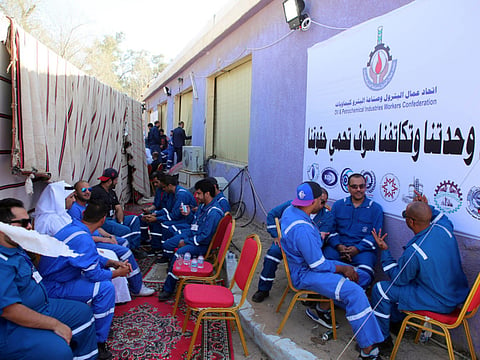Kuwait oil operations ‘smooth’ despite strike
More than 20,000 oil workers in Kuwait begin open-ended strike protesting alleged pay cuts

Kuwait City: Oil workers in Kuwait have gone on strike to protest proposed government cutbacks as the Opec nation grapples with a prolonged slump in crude prices.
Thousands of workers gathered at the start of the local workweek Sunday in the town of Ahmadi, where the state-run Kuwait Oil Company has its headquarters.
Oil worker unions approved the strike last week after failing to reach common ground with Kuwait’s Oil Ministry.
An open-ended oil strike planned by Kuwait’s over 20,000 oil workers started today as the State-owned Kuwait Petroleum company waits with bated breath.
On Thursday, the company said it was reviewing “maximum” contingency plans in the face of a total strike threatened by oil workers over alleged pay cuts. KPC said in a statement its board of directors discussed “alternative plans and precautionary measures” at all its affiliate companies after the oil workers union declared an open-ended strike starting today.
The board was briefed by heads of Kuwait Oil Company, responsible for production and exploration, and national refinery Kuwait National Petroleum Co on their “maximum emergency” plans, it said, without giving details.
Local media reported on Wednesday that Kuwait was to deploy national guard units to run and protect some oil facilities during the strike.
Hit by the sharp drop in crude prices, Kuwait is introducing a new payroll scheme for all public employees and wants to include the country’s 20,000 oil workers, which would mean an automatic cut in wages and incentives.
The strike comes as representatives of major oil-producing nations gather in nearby Qatar to discuss plans to freeze oil output in an attempt to shore up prices. The drop from over $100 a barrel in 2014 to around $40 now is straining budgets of large producers such as Kuwait.
Kuwait’s oil and gas refineries are still operating after state-run Kuwait National Petroleum Co said the oil workers union went on strike.
Operations at the country’s three fuel-processing plants were “smooth” as the company followed contingency plans for working with reduced staff, Khalid Al Asousi, spokesman for Kuwait National Petroleum, said by phone on Sunday.
Kuwait Petroleum Corp. will continue to provide fuel to the local market and can meet demand for exports from international customers, the company said on Twitter. Calls on Sunday to the Oil and Petrochemical Industries Workers Confederation weren’t returned.
About 13,000 members of the union were set to walk off the job at 7am local time in Kuwait to protest reductions in their wages and benefits, union head Saif Al Qah’tani said by phone on Thursday.
The drop in oil prices by nearly 30 per cent in the past year has strained government budgets across the Middle East, pushing states to cut spending, subsidies and rein in benefits. Kuwait is the fourth-biggest member of the Organisation of Petroleum Exporting Countries with 3 million barrels of daily output, according to data compiled by Bloomberg.
Kuwait’s refineries have capacity to process about 900,000 barrels of crude a day, making refined products such as gasoline, diesel and jet fuel for domestic use and export.
Negotiations with the strikers are continuing, Mohammad Al Shatti, Kuwait’s representative to Opec, said in Doha.
List of demands
The following is a list of demands from the union, as published by Kuwaiti newspaper Al Anbaa:
- Reinstatement of workers’ rights that have been cancelled or reduced
- An increase of all salaries every three years; reinstatement of allocations for overseas medical treatments; honouring workers during and after services
- Application of the 1984 agreement with the labour union and the decision of the labour union regarding allocating travel tickets for official and study trips
- Preservation of the per diem on foreign trips and workshops and of the support for camp activities, club memberships and health clubs
- Preservation of workers’ rights
- Special consideration for the special nature of the oil sector and the contracts between the workers and the oil corporation
- Preservation of the bonuses for leaders and workers
- Implementation of court rulings in favour of the employees
Sign up for the Daily Briefing
Get the latest news and updates straight to your inbox



